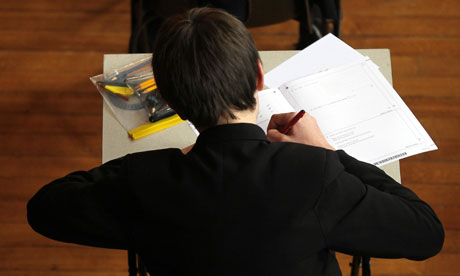 Schools are bracing themselves for bad news in this year’s GCSE exams, thanks to a perfect storm of changes – with some attempting to weather it by switching from domestic to international versions of the exams, which some claim are easier.
Schools are bracing themselves for bad news in this year’s GCSE exams, thanks to a perfect storm of changes – with some attempting to weather it by switching from domestic to international versions of the exams, which some claim are easier.While top A-level grades this year were marginally down on 2012, the publication of GCSE results on Thursday is expected to see a larger drop caused by a combination of factors, including a revised set of science exams and a rush of students taking subjects a year early.
There are also likely to be charges that schools are gaming the system by having pupils sit the same subjects twice, taking papers from different examination boards.
The result is likely to be a fall in overall GCSE grades compared with last year, when the number of pupils earning the government’s benchmark of five A* to C grades fell to 69.4% from 69.8% in 2011.
The exam standards watchdog, has already issued a warning that this year’s GCSE results are likely to be lower, but insists that overall standards will be unchanged.
A fall would mean that both A-level and GCSE results have declined nationally for two years running. While the falls may be statistically insignificant – they could easily be random rather than resulting from any direct cause – the mere fact of declines after two decades and more of rising marks is likely to be politically significant.
One of the biggest changes this year is the sudden jump in entries for the so-called international GCSE, or iGCSE, a version of the exam originally offered by exam boards for the overseas market but which has been adopted by some schools domestically. The increase has been most marked in English, which was at the centre of controversy last year over tougher marking. In 2012, there were just 18,000 entrants in the English language iGCSE but this year the total has ballooned to 78,000, more than one in 10 entries overall.
Some teachers allege that schools are carefully choosing between the different exams on offer, with cases of pupils being entered for both domestic and international versions of GCSE papers to improve their chances of getting over the crucial C-grade threshold in at least one paper.
Russell Hobby, general secretary of the National Association of Head Teachers, said the tactics were no surprise, given the sense of constant upheaval in the British examination system.
“It is no wonder that schools are looking for stability by abandoning UK qualifications in favour of international tests like the iGCSE, or seeking to protect their students from uncertainty by entering them for multiple papers,” Hobby said.
“Above all, the system is reeling from fundamentally irreconcilable pressures: every school must increase results each year, while the regulator must ensure that results do not go up each year. This is both illogical and unsustainable.”
Schools must reach a floor target of 41% of pupils gaining Cs or above in five core subjects, or face inspection by Ofsted.
An investigation by the Times Educational Supplement, to be published on Wednesday, reports claims that schools are happy to switch to iGCSEs – which for English are treated as equivalent to domestic GCSEs in meeting government performance targets – because they are perceived to be easier.
According to the TES, teachers posted in an online forum claimed iGCSE English papers were “an absolute doddle” and “way easier” than the domestic version.
Professor Alan Smithers, director of the centre for education and employment research at the University of Buckingham, told the TES: “Word has got round that the English iGCSE is easier and schools that are having to pay particular attention to meeting the floor GCSE target seem to be presenting the iGCSE to their pupils.”
The exam boards all rejected suggestions that their iGCSEs were easier than domestic GCSEs.
A spokesperson for Pearson, which owns the Edexcel exam board, said: “Our international GCSEs were initially developed for the international market, and are renowned for being academically rigorous. This is true across all subjects. The Edexcel Certificate [iGCSE] is subject to the same regulatory processes and controls as GCSEs.”
What impact the switch to iGCSEs has on this year’s domestic GCSE results remains to be seen, depending on the achievement of the candidates who switched exams. If the switch was by schools with higher-ability students, then the effect would be lower domestic GCSE results.



















0 comments:
Post a Comment